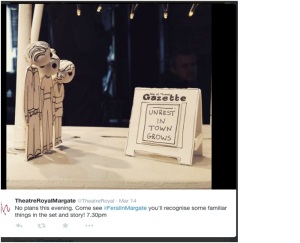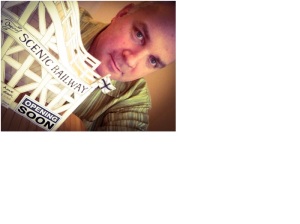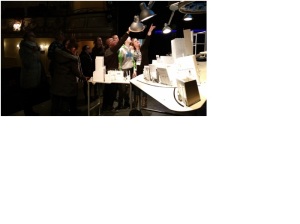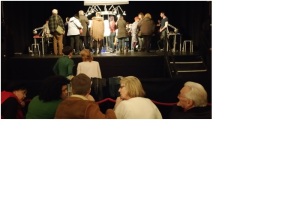A brief introduction from Maddy Costa: I’m now well into handover with NTiYN, visiting communities not to host conversations myself but support local volunteers in hosting their own Theatre Clubs. And because they’re run by people in and for a place and a community, these Theatre Clubs aren’t just post-show discussions: they’re actual social groups who will meet on a regular basis to see shows, chat and enjoy spending time together. It’s basically my dream come true. Anna Bodicoat is one of the three new volunteers based in Margate: I hope her post inspires people to contact her and join in.
By Anna Bodicoat
I love theatre that makes you think and feel deeply, the kind of theatre that might sometimes ask you to put a bit of work in. I know not everyone feels completely comfortable with this, and maybe sometimes discomfort is partly the point. I wonder how tolerable that discomfort feels, especially if you go to the theatre without a chance to talk about it afterwards.
I am lucky enough, in my work and in the things I do, to have lots of chances to share ideas, explore feelings, and work out what I think through conversation. In many interactions I have I can be tentative and test out ideas knowing that it is a safe thing to do, that I’m not going to be shouted down or told I am wrong.
Even so, I have loved the opportunities provided by Fuel and the NTIYN project, to be part of something that allows people to do that within a framework of exciting contemporary theatre. My first theatre club discussion was after This Is How We Die, a steamroller of a piece that left me in awe. Attending the discussion was as much a part of my experience as the show itself, and I want to shout about theatre club from the rooftops!
I want to tell people how great it is to be given the chance to talk about their ideas, to explore how theatre makes them feel and what it reminds them of.
I want to share what effect one such discussion had on me and the people who gathered in the upstairs bar at Theatre Royal Margate on October 2nd.
We picked Daniel Bye’s Going Viral for the first meet of Margate Theatre Club. The premise that piqued our interest and hinted that there may be a discussion to be drawn out of the play was: ‘An aeroplane flies from India to England. Everyone on board is weeping. Everyone except you. On the ground, the weeping spreads. Is it a strange new disease? An outbreak of hysteria? Or has the world become genuinely sad?’
We were led around the outside of the theatre and through the stage door to be seated on the stage behind the curtain, one of the first plays to be done like this at the Theatre Royal. This created a really intimate feel to the performance, added to by Daniel starting the play seated in the audience, offering nuts, and hand sanitiser and asking direct questions about our state of health! Throughout the play, he challenged the audience to look at each other, to imagine themselves inside the story. I noticed just how responsive we were as an audience, almost hyped up, performing ourselves, ‘acting’ as audience members. Maybe, in part, this was a response to what he put himself through, with scenes where he attempted to induce tears in himself, making us all wince and challenging us to feel for him.
One of the themes of our discussion was connection. We talked about the connection he was inviting us to make, with him and with each other. We wondered about our connection to the world and to people in need, particularly at present our connection to refugees. We thought about compassion and how we show it in a country famed for its ‘stiff upper lip’. I was taken by Daniel stating that the people that make Britain profitable apparently had immunity to the outbreak, saying something about the empathy deficit within the higher echelons of society and big business. We also talked about responsibility, and we thought together about what responsibility the main characters did, or didn’t, shoulder at a time of crisis.
Throughout the discussion I was struck by the bravery people had in sharing, how honest they were about what they thought, even if they may have been in a minority. Of particular note were a couple of people who did not see any metaphors in the piece, and we were able to talk about witnessing the play on completely different levels. A poignant moment for me was talking about grief and how the play explores it. We talked about private and public expressions of grief and sadness, and what is ‘permitted’ in today’s society. I was reminded of the experience in grief where you cannot believe the world still continues as normal, despite someone you love being dead. At a time like that, I want the whole world to be crying too, just like in Going Viral. I wondered whether the contagion of weeping people were carrying the sadness of the main character in a way that he couldn’t find a way to express.
Overall, the play and the theatre club confirmed my experience of the arts as a way of processing and exploring difficult emotions and topics. I think the space in the upper bar gave people a taste of what thoughtful and exciting theatre and discussion can be like. As long as people feel safe enough to express an opinion, and feel heard when they do, I think it is likely that they will use a discussion space to gain much more from a theatre piece, even if they come away with more questions than when they went in.




